Jamaica @ Chess Olympiad (Bled, Slovenia)
through a Jamaican Microscope: A Fantastic Sojourn
by Ian Wilkinson (Kingston, Jamaica, WEST INDIES)









“A tower of nine stories begins with a heap of earth. The journey of a thousand li starts from where one stands.” – Tao-te Ching
(Chapter 64 by Lao Tzu (c. 604 – c.531 BC), Chinese philosopher, founder of Taoism)
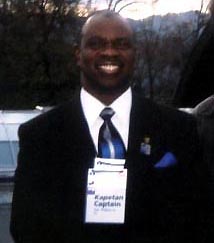

History has now recorded that Russia (38½ points) won the men’s competition ahead of Hungary (37 ½) and Armenia (35). In the women’s competition China (29½ points) was victorious ahead of Russia (29) and Poland (28).
The 35th chess Olympiad in Bled, Slovenia was the biggest hitherto and, arguably, the most successful to date. The following is an attempt to share some of what transpired in Bled from the writer’s perspective.
“Reggae Chess Ambassadors”
Jamaica’s journey to the 35th Olympiad held in Bled, Slovenia began with the very first steps by the country’s “chess ambassadors” to the Norman Manley International Airport in Kingston, Jamaica on the night of Wednesday 23rd October, 2002. There were two teams in the Jamaican contingent comprising seven men. Before the Air Jamaica “lovebird” jet took to the air for England, there was excitement on board as a patently drunk and rowdy passenger had to be physically escorted off the aircraft. Were there to be more exciting times ahead?
.jpg)
Jamaican National Teams
Left to Right: FM Warren Elliott, recently-crowned national champion NM Shane Matthews, NM Jomo Pitterson, NM Duane Rowe, NM Robert Wheeler, candidate master Mark Smith and yours truly as non-playing captain) and (Maria Palmer, National Female Champion Deborah Richards, Hui Zhu and Vanessa Thomas
On to Gatwick
After a smooth flight and marvelous landing at Heathrow airport we journeyed via bus to Gatwick airport for the Air Adria flight to Slovenia. Interestingly, while passing the time in trans, members of the Zimbabwean team (including IM Robert Gwaze) joined our party. Who would have thought that Gwaze would leave such an indelible mark on the Olympiad? I should have known, however, as I recall seeing the hunger in his eyes, especially when he asked if he could play a few blitz games against us in the airport.
            |
|---|
Missing Luggage
We arrived in Slovenia about midnight local time with our Zimbabwean counterparts and had to wait a couple of hours for our visas to be processed. Our arrival was soured by the discovery that our luggage was delayed. It was extremely cold, almost sub-zero temperatures. The luggage came a day later.
Accommodation
We checked into the Hotel Krim, a 50-year hotel with 115 rooms. In the next couple of days we discovered that there were players from many other countries also staying at there, including people from Russia, Cyprus, Yugoslavia, Barbados, Aruba and Costa Rica. Our stint at the hotel was comfortable.
“For many persons it was exciting to be rubbing shoulders with all these individuals whom one would only normally see, hear or read about on the web or some other medium.”
Opening Ceremony
The opening ceremony was held on Friday the 25th October, 2002 in the great sports hall which was to be the site for the games/matches. This was a very colourful affair highlighted, for me, by two sets of dancers, one in black and the other in white outfits. The dancers were dressed as chess pieces dancing on a floor decorated as a large chess board.
Many influential persons in the chess world were present including Honorary President (and former FIDE president) Florencio Campomanes (whom I noticed during the rounds watching the games of Eugenio Torre and other players from the Philippines) and a number of prominent grandmasters such as Garry Kasparov, Ruslan Ponomariov, Peter Leko and Judit Polgar.
For many persons it was exciting to be rubbing shoulders with all these individuals whom one would only normally see, hear or read about on the web or some other medium.
Pre-Tournament Briefing
Although there were one hundred and forty-one (141) teams registered to play in the men’s competition, only one hundred and thirty-four (134) showed. Ninety (90) teams were registered to play in the women’s competition.
Before the Olympiad began there was a meeting of the captains for all the teams. This meeting was chaired by the Chief Arbiter, the affable Dutchman Geurt Gijssen (pronounced “hurt hi-sin”). Also present was Boris Kutin, the director of the Olympiad and president of the technical commission which had the responsibility of ensuring that there were no technical glitches. At this meeting the rules of play, time controls, roles of the captains etc. were discussed. It was refreshing to see the organizers trying their best to accommodate the wishes of the teams.
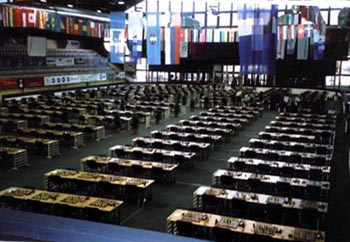

The Procedure before the Matches
Before each round, each team had to submit its “team composition”, that is, the persons who would be playing that round. The men played on four boards and the women on three. One point was awarded for a win, half a point for a draw and zero for a loss. The time control was game in 90 minutes with 30 seconds increment per move.
By the rules of the competition, players on lower boards could move up but the converse did not apply. For example, someone registered to play on board three could be elevated to play on board two but a board one player could not be moved down to play on board two. A few teams, interestingly, had their titled or highest ranked player on their lowest board!
For the first two or three rounds the matches began at 2:00 pm. This was later changed to 2:30 pm after a second meeting of all the captains, again chaired by the Chief Arbiter. Similarly, after the first few rounds each team kapetan had to submit his team’s composition for the next round by 9:00 am on the playing day. The full list of persons playing would then be published by about 11:00 am, allowing only a couple of hours for preparation against confirmed or specific opponents.
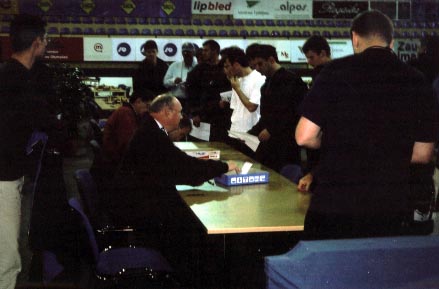

Team Captains submitting lineup cards. Chief Arbiter Geurt Gijssen is seated (near left).
Just before the commencement of the games, the sports hall was a buzz of activity with a sea of bodies. The men’s teams played in the Southern part of the venue and the women in the Northern section. The matches would start after the chief arbiter in his Dutch-accented English would welcome everyone and then almost gleefully say “arbiters start your clocks” after which about one hundred (100) sodniki (arbiters) would hurry to press the “start” button on the various time pieces.
After the round had ended, about 7:00 p.m. each day, a list of the formal results and the pairings for the next round would be posted at strategic points (e.g., the press centre) and/or mailed to the respective hotels or venues housing the teams. It was sometimes amusing to see adults eagerly awaiting the pairings like children awaiting gifts at Christmas time.
Grandmasters in Abundance
On any given day there were sixty-seven (67) matches in the men’s competition, that is five hundred and thirty-six (536) players with approximately one hundred and eighty (180) grandmasters (GMs)!
In the women’s competition there were forty-five (45) matches each round with two hundred and seventy (270) players. From my recollection only three “outright” GMs, namely China’s Zhu Chen, the world female champion, Georgia’s Maia Chiburdanidze, former world female champion and Bulgaria’s Antoaneta Stefanova played in the women’s section. “Super GM” Judit Polgar, of course, played on board two for Hungary in the men’s competition. Approximately sixty (60) Woman Grandmasters (WGM) competed in each round.
In summary, between the two competitions there were 403 games played each round. Each board was identified with the number of the match being played thereon and the names, titles and ratings of the competing players. After each game was finished the arbiter would normally indicate the result for all concerned to see by placing the relevant cards (e.g. “0”, ½ or 1) in the spaces allotted. At the end of the match the final result (e.g., Jamaica 4 Guernsey 0) would be indicated.
There is Life Apart from Chess: “The Tent”
Chess players showed that there was another side to their character. There was a lot of partying at various venues and a lot of drinking. Beer was one of the chief “victims”.
After each round, many players relaxed by visiting the tent which was erected about 30 yards from the Hotel Krim and just a few yards to the east of the playing hall. There were many vendors in the tent selling chess books, equipment and software. The location, however, was particularly attractive because of the seemingly endless supply of food, drinks (alcoholic and otherwise) and music. The bar annexed to the playing hall was also a common meeting ground where players would relax, chat and have a few beers. Salud Señor Wheeler!
The “Spinning Pigs”
Rastafarians would have cringed because on a regular basis one would pass the tent in the mornings or during the days and see a whole pig being roasted… spinning inexorably over the fire. We concluded that Slovenes loved meat, especially pork. Sausages were standard fare.
Lake Bled
Lake Bled was the essence of natural charm and is one of Slovenia’s greatest attractions. Many players took the time to walk around the Lake (approximately a 90-minute walk) and to enjoy the beautiful flowers, lush vegetation and breath-taking scenery. Trips to the nearby castle were also frequent.
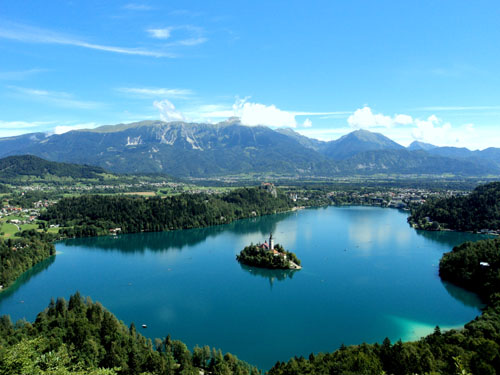

Mountain view of Lake Bled
Negative Moments
For me there were some disappointing moments at the Olympiad and I now list a few:
- Not being able to participate as a player.
- Missing the chance to have a good chat with some GMs, especially Alexander Khalifman and Judit Polgar.
- Jamaica’s men’s loss to Ethiopia in round eleven.
- The failure of the Jamaican men to get at least a point from Kyrgyzstan in the final round.
- The Jamaican women’s many misses, especially Maria Palmer overlooking mate in two with a spectacular Queen sacrifice (23.Qxh7!) in her game against Iceland’s Lilja Gretarsdottir in round two action, and Hui Zhu missing 25…Ke6! or 25…f5! which would have led to victory against Algerian Woman International Master (WIM) Farida Arouche in round three.
- Not having enough time to see Slovenia nor one of its residents, the legendary Jamaican track and field athlete Merlene Ottey, who was reputedly in New York, USA during our visit.
- Watching Zambian IM Amon Simutowe (with shock written all over his face) losing to the Dominican Republic’s IM Ramon Mateo in round eleven.
Memorable Moments
- Jamaica’s board three Vanessa Thomas’ win with the white pieces over Slovenia B’s WFM Ksenija Novak in round one. This was a Jamaican female player’s first victory over a woman FIDE Master.
- Jamaica’s board one Maria Palmer’s unbeaten performance in her last six matches. Palmer, after starting with several consecutive defeats, played thereafter with assurance and finished with a creditable fifty percent score thereby earning a FIDE rating of 2050! Her demolition of New Zealand’s Vivian Smith’s Pirc in round six involved a queen and two rook sacrifices!! (see position)
- Jamaica’s board two/three female player Hui Zhu’s mating Botswana’s Tshepiso Lopang in 23 moves in round four after sacking three pawns consecutively to deliver the coup de grace (23. Nf6#) with most of the pieces still on the board. Zhu also finished with a fifty percent score and earned a FIDE rating of 2050.
“Jamaica’s highest rated player is to be commended for making the trip and representing his country although he lost his mother only a few days before the Olympiad started.”
- My impromptu hugging, lifting and spinning Jamaica’s Vanessa Thomas after she managed a miraculous draw against Puerto Rico’s Miriam Basem-Hassan in the board three encounter in round eight. This result enabled Jamaica to draw the match. This “quiet” celebration and display of emotion was met with numerous smiles and curious stares by security personnel, arbiters, players and spectators.
- The Jamaican women’s 2-1 victory over European team Luxembourg in round ten. I recall Luxembourg GM Alberto David (board one for the men’s team) visiting the match on several occasions to look at the games and could not believe what he was seeing. David went on to win a silver medal for his 85% performance on board one.
- National champion Deborah Richards’ fighting loss (almost 80 moves) to the seasoned Luxembourg WFM Grazyna Bakalarz on board one in their round ten encounter. Richards learnt the game/moves less than one year ago!!
- The raucous welcome given to Jamaican NM Shane Matthews on his arrival at the Hotel Krim on Sunday 27th October, 2002. Jamaica’s highest rated player is to be commended for making the trip and representing his country although he lost his mother only a few days before the Olympiad started.
- Jamaica’s board four candidate master’s Mark Smith’s victory over the Dominican Republic’s Marcelo Carrion in round three.
- Jamaican NM Duane Rowe’s win over Malta’s Joseph Grech in round 9, which enabled Jamaica to win the match.
- Jamaica’s NM Jomo Pitterson’s efficient victory over Aruba’s Leonardo Carter’s King’s Indian Defence on Pitterson’s birthday in round 12.
- Trinidad & Tobago’s Christo Cave’s spontaneous utterance of a colourful expression (not fit for airplay!!) upon blundering and dropping a piece in time trouble when he had at least a drawn position (up a passed pawn) against Moldova’s IM Alexey Khruschiov in first round action
- Barbados and Trinidad & Tobago’s bloody West Indian war in the men’s competition in round three. This match was drawn after each nation won two games.
- Seeing and listening to the debonair International Arbiter Jerry Bibuld as he worked, took pictures and/or reached for his Slovenian dictionary to fortify himself before attempting to converse with the Slovenes.
“Gwaze’s play epitomized the exciting nature of chess when it is played in positive and/or uncompromising fashion.”
- Hungarian GM Judit Polgar’s Ruy Lopez defeat of Azerbaijani GM Shakhriyaz Mamedyarov in round four. Polgar unleashed the spectacle 12.Nxf7!! sacrifice of her steed and the rest was history.
- The ageless wonder, septuagenarian Russian-born Swiss GM Victor Korchnoi’s victory over the strong Israeli board one GM Ilya Smirin in round two play as both countries drew 2-2. This game attracted a bumper crowd.
- 1999 FIDE World champion Russian GM Alexander Khalifman’s military strolling between moves, punctuated by profound concentration on his face.
- Watching Zimbabwean board one IM Robert Gwaze play, especially his last two games where he decimated Hong Kong’s Edwin Borigas (round 11) and Bahrain’s Ibrahim Dafi Almannai (round 12). Gwaze’s play epitomized the exciting nature of chess when it is played in positive and/or uncompromising fashion.
- Garry Kasparov’s grand entrances. One notable memory is China’s board one GM Ye Jiangchuan sitting all alone like a lost infant waiting for its parent (far right). More than five minutes after all the other games had started Kasparov arrived to scores of flashing bulbs and clicking cameras and proceeded to win a thrilling Sicilian with the white pieces in this round 10 encounter.
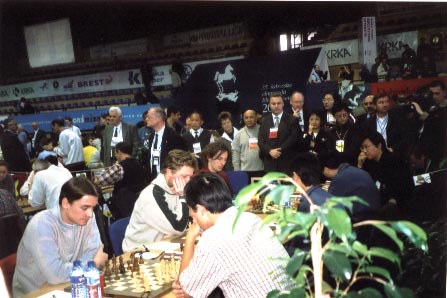

The Bears (Russia) vs. The Dragons (China)
- Watching the physically-disabled chess gladiators playing from their wheelchairs and dismantling other players.
- The quizzical look on English GM Michael Adam’s face before and after he made his moves. To me, he and Ukraine’s Ruslan Ponomariov were ultra cool and displayed true sangfroid in spite of the heat of battle.
- Garry Kasparov’s demeanour and facial contortions while playing, whether or not he was sitting or standing at the board or strolling during moves. Of all the grandmasters at the Olympiad, I believe that the “King of Russia” was the most expressive and displayed the most passion. Small wonder that he did so well with an amazing 2933 performance.
- The youthful vigour and determination of the Indian and Azerbaijan teams.
- Watching English GM Luke McShane (with only a Rook) draw a Rook ending against Poland’s GM Tomasz Markowski (Rook and pawn) in the final game of their round 14 clash which saw England prevailing 2½-1½. Among the crowd that gathered to watch the textbook ending was Trinidad and Tobago’s Ravishen Singh who looked on anxiously, as victory by the Pole would have relegated Singh to a bronze, in lieu of silver, medal for his board five efforts.
- The closing ceremony, particularly the loud applause which greeted the Ethiopian team (for winning the first place prize in group D for men). The men from Addis Ababa looked very patriotic in their national colours; Trinidad’s Ravishen Singh winning the silver medal for board five; the special recognition given to the sartorially-elegant Zimbabwean IM Robert Gwaze as he collected his trophy for board one honours – a perfect 9-0 performance; and the joy on GM Alexander Khalifman’s face as he was mobbed by fans and signed autographs after the ceremony.
- Taking a picture of the two Zhu’s together, Women’s World Champion and Jamaica’s Chinese-born player (below).
- The party in “the tent” after the ceremony. The Russians, Americans (Yasser Seirawan was in his element) and the Jamaicans in particular had a great time. Never before in the history of mankind has so much liquor been consumed by so few. Apologies to Sir Winston Churchill.
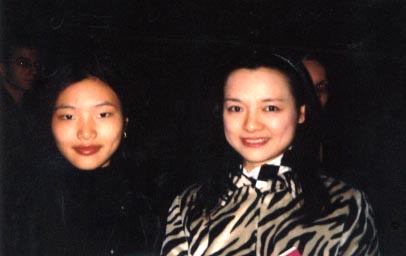

Jamaica’s Zhu Hui with China’s Zhu Chen
Hanging with the beautiful African brothers and sisters, especially those from Botswana, Zambia and Zimbabwe. Woweee those sistahs were fine!
- Participating in the blitz-fest with the Jamaican masters at the Hotel Krim upon leaving the post-closing-ceremony-party in the tent. Everyone was “cherry” and seeing ten Rooks on the chess board!! I will never forget NM Shane “The Magician” Matthews‘ non-stop laughing as the white wine took a firm grip!
- NM Robert Wheeler’s attempts at jokes. Some of the attempts were themselves jokes! Well, if truth be told, some were quite good. If the jokes fell short Bob atoned with his excellent commentary while we watched midnight movies!
- Chief arbiter Geurt Gijssen patrolling the playing area like a Sergeant in the marines and winking from time to time.
- Discussing West Indian and international cricket with Russian GM Peter Svidler! Come on now! A Russian super GM with an intimate knowledge of cricket??!! What else will one encounter on this planet ??!!
- Zambian IM Amon Simutowe’s strong play, especially against the Grandmasters (the Brazilian GM Gianni Vescovi and the Albanian GM Erald Dervishi come to mind).
- The restaurant staff at the Hotel Krim, particularly Damian and Ramiza.
- Hanging with the beautiful African brothers and sisters, especially those from Botswana, Zambia and Zimbabwe. Woweee those sistahs were fine!
- Hearing Reggae music (Bob Marley and Jimmy Cliff) being piped through the ceiling while in the restaurant in the Hotel Krim.
- Spending time in the press centre, especially watching, working with, and listening to, the (other) journalists.
- Meeting, chatting and taking pictures of/with a lot of beautiful women including China’s Zhu Chen, France’s Almira Skripchenko-Lautier and Russia’s Alexandra Kosteniuk.
- Meeting, chatting and taking pictures with many marvelous players including Simutowe, Kasparov, Svidler, Vladimir Akopian, Nigel Short, Loek Van Wely, Alberto David, Miguel Ilescas, Joel Lautier, Alexander Beliavsky, Yasser Seirawan, Sergei Rublevsky, Vassilios Kotronias, Walter Arencibia and Etienne Bacrot just to name a few.
- The warmth and hospitality of the Slovenes.
- Being in Bled, Slovenia!!!
.jpg)
ZAMBIA












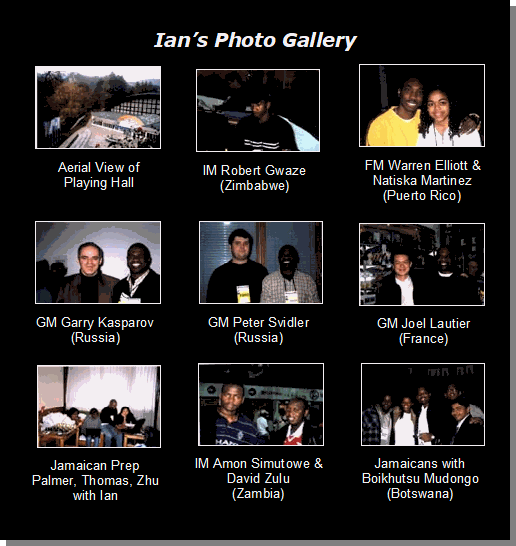

Mixed Feelings
It was with mixed feelings that I left Bled. I was, of course, happy to return home but I was very sad that it was all over. The ambience and atmosphere of the playing hall, the press centre, the view of the Alps and Lake Bled, the players milling around, meeting and greeting each other, furrowed brows searching for the truth at the chess board are images which will remain with me forever.
In my humble opinion the 35th chess Olympiad was a resounding success. One only hopes that the 36th edition scheduled for the island of Minorca in 2004 will be even better.
Ian Wilkinson
Kingston, Jamaica
1st December, 2002



.jpg)